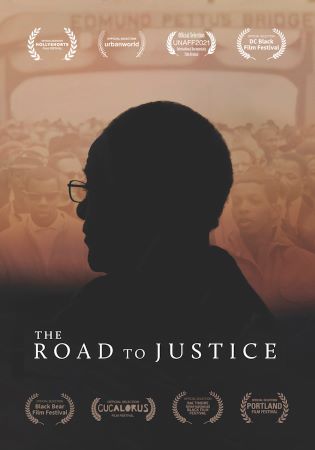
The Road to Justice 2021
Distributed by The Video Project, 145 - 9th St., Suite 230, San Francisco, CA 94103; 800-475-2638
Produced by Graham Raubvogel, Andre Robert Lee, Janet Moore, and Teresa Stack
Directed by Kaliya Warren and Brendan Hall
Streaming, 31 mins
Middle School - General Adult
Civil Rights; Race Relations; U.S. History
Date Entered: 04/07/2022
Reviewed by Kathleen H. Flynn, Science Librarian, University at AlbanyIn The Road to Justice, viewers follow two groups of people as they take a guided history tour of the American South to learn about the Civil Rights Era. The tour is part of the Civil Rights History Program of The Nation magazine. One of the two groups of learners is a group of middle school students from a Chicago school, while the other is a group of adults who lived through the Civil Rights Era. The journey takes them through Mississippi, Arkansas, Alabama, and Tennessee. They learn about history such as sharecroppers, Emmett Till’s murder, the Freedom Riders, the Little Rock Nine, the Sixteenth Street Baptist Church bombing, and Martin Luther King Jr.’s murder.
This short documentary would be ideal for students and adults to both learn about pivotal moments in U.S. history and become encouraged to reflect and discuss them candidly with each other. Many of the adult tour attendees in the film are surprised to discover that despite having lived through the Civil Rights Era, the tour expanded their knowledge of it. Meanwhile, the students express their confusion about what they learn. They do not understand how people could treat others that way. As viewers are taken on the tour alongside the two groups, they will inevitably find themselves empathizing with some of the thoughts and reactions expressed by those in the groups. Identifying with the attendees could help spark discussions about the film and events, especially among student viewers.
This film is highly recommended for courses or collections on the U.S. Civil Rights Era. However, it should be noted that there are a few profanities used in one scene. Instructors in middle or high schools may want to consider that before using it in the classroom. As it is only 31 minutes long and briefly discusses many events, it may be best for classroom instructors to include lessons on those events before or after viewing.
Awards:Official Selection, Baltimore International Black Film Festival; Official Selection, DC Black Film Festival; Official Selection, Holly Shorts Film Festival; Official Selection, Portland Film Festival; Official Selection, Cucalorous Film Festival; Official Selection, Urbanworld; Official Selection, UNAFF; Official Selection, Black Bear Film Festival
Published and licensed under the Creative Commons Attribution 4.0 license. Anyone can use these reviews, so long as they comply with the terms of the license.